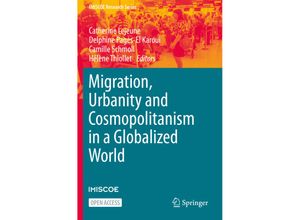This open access book draws a theoretically productive triangle between urban studies theories
of cosmopolitanism and migration studies in a global context. It provides a unique
encompassing and situated view on the various relations between cosmopolitanism and urbanity in
the contemporary world. Drawing on a variety of cities in Latin America Europe Asia Africa
and North America it overcomes the Eurocentric bias that has marked debate on cosmopolitanism
from its inception. The contributions highlight the crucial role of migrants as actors of urban
change and targets of urban policies thus reconciling empirical and normative approaches to
cosmopolitanism. By addressing issues such as cosmopolitanism and urban geographies of power
locations and temporalities of subaltern cosmopolites political meanings and effects of
cosmopolitan practices and discourses in urban contexts it revisits contemporary debates on
superdiversity urban stratification and local incorporation and assess the role of migration
and mobility in globalization and social change.



